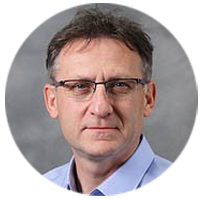
In early 2020, we launched the SIMULIA Champions program. The 2020 SIMULIA Champions are the inaugural team of brand ambassadors, whose expertise and passion position them to advance the future of simulation technology. In this series of blogs, we introduce some of our individual SIMULIA Champions, finding out more about their history – and future – with the technology.
Thomas Siegmund is a Professor of Mechanical Engineering in the School of Mechanical Engineering at Purdue University in West Lafayette, Indiana. In addition to teaching and research, he oversees a laboratory called the Microstructure Testing and Analysis Laboratory, which has both a physical and a computational component. Siegmund works with both graduate and undergraduate students at all levels at Purdue. Purdue University is a land grant university and member of the Big 10. It is classified as R1: Doctoral University – Very high research activity, and the College of Engineering is ranked in the top 10 US wide.
Siegmund and his students use Abaqus “extensively and nearly exclusively” when it comes to finite element analysis, he says. Siegmund has worked with the software since 1991 and has been using it at Purdue since 1998.
“In my career, I became interested in materials a long time ago,” he says. “I found and still find that materials are a fundamental aspect of what we as human beings are about.”
His interest extends to all kinds of materials, from engineering to biological.
“I have a specific interest in understanding them from a theoretical, computational point of view,” he says. “As systems become more complex, things cannot be solved by pen and paper. Computation is essential for that.”
Siegmund considers his greatest successes to be guiding students from the beginning of their undergraduate and graduate education to the completion of a degree such as a Ph.D. He likes to help them learn what they can do and to see them develop both personally and in their scientific and problem-solving skills.
“The individuals who come from an institution like Purdue are our main asset,” he says. “We recognize that we can only conduct research so much and produce so much research output, but those who take it from here to a position at another research institution or company or government lab amplify our reach into what we can do.”
Siegmund’s motivation stems from a desire to solve problems and to tell the story of how the problem was solved in a journal publication that someone else can pick up, learn from and possibly expand on. He has published 200 academic papers and patents, and his current research focuses on computational mechanics relating to fracture and fatigue, biomechanics and architectured material systems.
Working in simulation comes with a great deal of responsibility, which Siegmund emphasizes to his students. Asking the right questions and coming up with the correct data can be the key to keeping people safe and allowing corporations to remain competitive.
Outside of work, Siegmund enjoys reading and keeping up with current events, as well as cooking.
SIMULIA is pleased to welcome Thomas Siegmund into the 2020 SIMULIA Champions program and excited to continue working with him in the future. Stay tuned to the blog to learn more about our other 2020 SIMULIA Champions.
SIMULIA offers an advanced simulation product portfolio, including Abaqus, Isight, fe-safe, Tosca, Simpoe-Mold, SIMPACK, CST Studio Suite, XFlow, PowerFLOW and more. The SIMULIA Community is the place to find the latest resources for SIMULIA software and to collaborate with other users. The key that unlocks the door of innovative thinking and knowledge building, the SIMULIA Community provides you with the tools you need to expand your knowledge, whenever and wherever.
